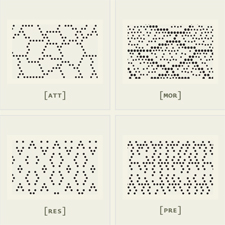TECHNE, EPISTEME, AND THE TROUBLE WITH SPEECH
Scott Pound
This essay examines the tendency for certain critical norms to be articulated as an opposition between writing and speech and the degree to which this opposition elevates epistemic principles over technical concerns at the expense of critical understanding.
SENSATE SOVEREIGNTY
A Dialogue on Dylan Robinson’s Hungry Listening
Sadie Couture, Jonathan Sterne, Mehak Sawhney, Shirley Roburn, Andy Kelleher Stuhl, Burç Köstem, Hannah Tollefson, Randolph Jordan, Landon Morrison, Allyson Rogers, Michael Nardone
Dylan Robinson's Hungry Listening: Resonant Theory for Indigenous Sound Studies emerges from encounters between Indigenous sound performance and Western art music. The book takes aim at the pernicious tendency for the latter to insist upon aesthetic assimilation as the end-goal of these encounters, which far too often means derogating the former’s ontologies and protocols of song. In this dialogue-review, members from the The Culture and Technology Discussion and Working Group (The CATDAWG) situate the book within sound studies and critiques of settler colonial listening, reflecting on the major conceptual contributions of the book such as sensate sovereignty, hungry listening, and critical listening positionality.
THE UPGRADE OF THE WILLIAM BLAKE ARCHIVE
Michael Fox
Central to the making of the new William Blake Archive, launched in December 2016, were contradictory ideas concerning perspective and aesthetics, and the roles of critics, scholars, and digital humanists. The Archive now embodies these competing ideas as well as others about such things as pleasure and hermeneutical similitude. In a light tone, this article explains these ideas through a multithreaded story told from the perspective of the Archive's Assistant Editor and Software Architect. The upgrade is the product of a major collaborative effort between the main editors of the Archive, graduate students, research computing consultants, and an outside design company, and is continually being improved.
THE AMODERNS: THINKING WITH ZOE
A Feature Interview with Rosi Braidotti
Heather Davis, Rosi Braidotti
Rosi Braidotti is a force of nature-culture. Her work since Patterns of Difference and extending through her trilogy, which includes Nomadic Subjects, Metamorphosis and Transpositions, has been vital to a resurgence of feminist, anti-racist, and materialist thought. Her incredibly prolific career engages with the material realities of politics within the frame of a feminist, Spinozist ethics. This conversation spans her theoretical investments in feminist geneaologies, zoe as foundational to secular materialist thought, and the state of the humanities in the contemporary university.
UNESCO AND THE WORLD-LITERARY SYSTEM IN CRISIS
Sarah Brouillette
This article discusses the implications for the literary field of the restructuring of global capitalist production since the early 1970s, using UNESCO’s literature-based programming as its case. Its particular focus is the real complementarity of what would appear to be divergent phenomena: expanding investment in the idea of the creative economy (proclaiming the social and economic protagonism of art and literature); and the exacerbation of structural asymmetries that delimit participation in this economy to an elite strata. It thus highlights the constitutive unevenness of relations in the literary milieu, produced by and enmeshed with histories of colonial occupation, and of subjugations via race, language, gender, and other forces.
THE POETICS OF CELEBSPLOITATION
Celebrity Culture and Social Media in Recent American Poetry
Paul Stephens
American poets in the era of social media are obsessed with celebrity – and especially with celebrity misfortune. I argue that the recent surge in poetry about celebrities poses important questions with regard to transmediation, high culture vs. mass culture, privacy, the mediatization of fame, and the nature of celebrity and microcelebrity. Poetry about celebrities tends to be highly conscious of how gender is represented in mass culture, and should be of interest to literary readers and new media theorists beyond the range of traditional poetry audiences. Poets under discussion include Andrew Durbin, Kate Durbin, Ben Fama, Lara Glenum, Kevin Killian, Tan Lin and Frank O'Hara.
THE AMODERNS: WHAT WE USED TO CALL "MEDIA HISTORY"
A Feature Interview with Wolfgang Ernst
Ghislain Thibault, Wolfgang Ernst
Wolfgang Ernst is one of the leading voices of media archaeology, a research field that has garnered a growing interest for its fresh theoretical and methodological approaches to the study of media. Ernst’s main contribution to media archaeology in the recent years has been a radical critique of history through a reflection on media temporalities. In this interview, Ernst proposes to understand media archaeology as an “exercise” for media studies scholars, a mode of attention that isolates the techno-logical components of media. As he addresses the technomathematical ontology of digital communication, the genealogy of symbolic machines and the question of humanism, Ernst offers here some more conceptual tools to help us navigate through his previous writings and to reflect on some of the new directions for media archaeology.
THE AMODERNS: THOUGHTS ON AN IMPOSSIBLE PROJECT
A Feature Interview with Bruno Latour
Heather Davis, Bruno Latour
Bruno Latour is one of the most widely recognized intellectuals of our time. His work on modernity has influenced scholars in every field of the social sciences and humanities and has involved ongoing collaborations with scientists and artists. In his most recent project, An Inquiry into Modes of Existence, Latour returns to the Moderns with the eye of an anthropologist to examine what is of value within the practices of modernity. This project takes place at the intersection of a book, a series of international meetings, and an online platform to enact the difficult work of diplomacy for the cause of ecologization.











